Hot sauce is a staple of most kitchens and a necessity in southern kitchens. But have you ever thought about how, where or by whom the hot sauce is made?Two chefs with deep roots in the south and the …
This item is available in full to subscribers.
Please log in to continue |
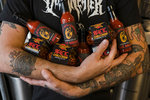
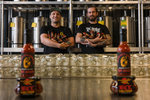
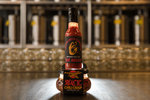
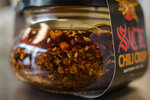
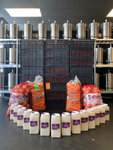
Hot sauce is a staple of most kitchens and a necessity in southern kitchens. But have you ever thought about how, where or by whom the hot sauce is made?
Two chefs with deep roots in the south and the Alabama Gulf Coast are manufacturing hot sauce and chili crisp in Orange Beach. The Southern Chili Lab (SCL) is working to become your go-to condiment company.
The chefs
Jonathan Kastner grew up in Lafayette, Louisiana, and has been an active part of the culinary scene in Orange Beach since 2015 when he opened Anchor Bar and Grill. He started working in restaurants at the age of 16. He landed in Chicago for culinary school after realizing his plan to be a physical therapist was not the career he wanted.
Before coming to Orange Beach, he worked in New Orleans and Chicago with numerous chefs, picking up influence and ethos along the way. The culmination of all those experiences resulted in the unique and locally sourced menu at Anchor Bar and Grill.
Tyler Braun also grew up in Lafayette, Louisiana, but did not meet Kastner until years later in Orange Beach. His love of food and cooking started in his grandmother's kitchen, but it wasn't until the age of 20 that he took it on as a career. In 2012, Braun landed in Orange Beach to open up Fisher's at Orange Beach Marina. He started as a sous chef and worked his way to Chef de Cuisine. His next stop was the James Beard Award winning Staplehouse in Atlanta in 2018.
After working in a James Beard Award winning restaurant, the next natural stop is a Michelin Star restaurant. Braun sold everything in 2019 and moved to Europe with the sole goal of landing a job in a Michelin Star kitchen. He worked several stagiaires (a short-term, unpaid kitchen internship) for three- or four-week stints before finally landing a position at Alouette, a one-star Michelin restaurant in Copenhagen, Denmark. Unfortunately, when the COVID-19 pandemic hit, his residential visa had not been finalized and he was required to return to the United States in February 2020. Braun returned to be a chef consultant in Fairhope and reconnected with Kastner.
How did we get here?
Working in the restaurant industry can take its toll on the body, and the work life balance isn't ideal. When Kastner was approached by Craig Williams, owner of Avenue Pub in Tuscaloosa, about buying Anchor Bar and Grill, he jumped on the chance.
"I loved Anchor, don't get me wrong. It was my baby and I loved it, but it was like having another child. My actual children were suffering because I was never there," Kastner said. "I wanted to do something that was in the food industry but didn't require me being there from 8 a.m. until midnight, seven days a week."
Anyone that had to chance to eat at Anchor Bar and Grill might recall the various condiments, sauces and culinary creations that Kastner was making in the tiny kitchen. Fermenting kimchi, hot sauce and pickles were normal kitchen tasks.
Kastner and his wife Sarah started brainstorming ideas for a new venture. The idea to start manufacturing hot sauce and chili crisp was born, but that was just the first of many steps. In October 2020, Kastner bumped into Braun at a backyard barbecue in Fairhope. Kastner filled Braun in on his hot sauce idea.
"I remember Jonathan was like we are going to sell Anchor. I was like, 'Dude, that's awesome, but what are you going to do?' He said he was thinking of doing a hot sauce company. Jokingly, I said let me know if you need a right-hand guy. I know how to ferment and do all this stuff. And he was like cool. I was like, 'Seriously? Let's go,'" Braun said.
"There are not many other people that I would put that much trust and faith in, but Jonathan Kastner is just an incredible human being and an incredibly smart guy. I felt very comfortable just saying let's do it," Braun said when asked about taking a leap of faith into the hot sauce business.
A leap of faith
Any new business is a leap of faith, but Kastner and Braun liken their adventure to jumping off a cliff with one parachute, Braun holding on to Kastner and hoping the chute will open.
"This is our first go at being in the manufacturing side of the business, and it is a whole different animal," Kastner said.
Months of brainstorming sessions and research went into starting the company. They found a space to rent at The Wharf thanks to Tilly and David Pan. It is a small space, but Kastner and Braun figured out how to maximize the space for optimum output.
They spent months finding fermenting equipment that was the proper size. Next, they had to test recipes on a small scale to decide what chilis would work best. It took several months for their food supplies to find a farm that could produce the red jalapenos needed.
The culinary mad scientists both admit they enjoy the research and development part of the process most. Changing ratios, trying different seasonings and changing the fermentation time.
Kastner knew it would take some time before they were up and running, but he did not expect it to take this long. According to Kastner, Southern Chili Lab is the first food manufacturing company in Orange Beach, and one of the few fermenting-based manufacturing companies in the state. Kastner feels being the first or one of the few made the permitting process take longer.
"There aren't a whole lot of people doing this. Most hot sauces are fresh. They are blending chili peppers and then adding vinegar to make it an acidified food so that it is shelf stable," Kastner said.
The first bottle of hot sauce was sent to the testing lab in June 2021. Along the way, SCL hot sauce was lumped into the acidic food category instead of the fermented. They had to go through more steps to prove their process. Now they have all the permits and licensing and sold the first bottles of hot sauce and chili crisp Sept. 1, 2022.
The Southern Chili Lab currently has two products on the market: a red hot sauce and chili crisp. The fermentation process gives the hot sauce depth of flavor with a mild heat. The simple ingredients: red jalapenos, onion, garlic and carrot are present and add flavor to whatever it is added to.
"With the fermentation process, you end up with a much more rounded flavor instead of other hot sauces that are much more linear," Braun said. "The fermentation process all happens in the first 31 days and after that it stays alive but is just aging. Most of the sauce bottled was in the 45-day range."
Most hot sauces use lots of vinegar to make them shelf stable, but the SCL hot sauce uses vinegar as a flavor. It is present but not the overall flavor.
Once the hot sauce is ready to bottle, the liquid is separated from the mash. The mash is them spread out on sheets and added to the dehydrator. The dehydrated chili, onion, garlic and carrot are used to make the crisp part of the chili crisp.
With the set up they currently have, Kastner said they could produce 10,000 bottles of hot sauce a month, but they are aiming to produce around 5,000 a month.
"With everything we do, we want to identify as a spicy condiment but not so hot it ruins your meal or palate," Kastner said. "We believe in contributing to a dish, not masking the flavors of a dish and not just absolutely wrecking your palate. Will we make some sauces that are super spicy? Yes, but they will be small batches, a couple of hundred bottles and it will be gone. It is not something that we are going to commit 60 fermenters to. We have some super hots that we are fermenting right now just to see what they taste like. We will do some of that, but it will all be small and limited release."
Kastner and Braun have several products in the research and development stages as well as green hot sauce and chili crisp that will have more heat. In true mad scientist fashion, the pair are taking some of their favorite products and putting their own spin on them.
Kosho, which means black paper is Japanese, is a spicy paste traditionally made using yuzu (a citrus fruit) zest, togarashi chili and sea salt. Braun said they have made a Kosho using blood orange and Meyer lemon.
Another item in the works is a southern take on togarashi, a spicy powdered seasoning mix made with dried chili peppers, orange peel, sesame seeds and seaweed. The SCL version uses local produce like dehydrated collard green instead of seaweed and Meyer lemon. The original plan was to use satsuma, but they were out of season at the time, but they plan to test it out as soon as they can get some fresh local fruit.
"We are constantly trying to add stuff to the portfolio besides just a hot sauce and chili crisp. We are working on a sambal right now that is really fun, a couple of spice mixes and more hot sauce and chili crisp," Kastner said.
Popping Up
Southern Chili Lab will be popping up around the area doing collaborative dinners and selling products.
"One of the things we have talked about from the beginning is how are we going to market our product. What are we going to do to get people to try it and buy it," Kastner said. "I think trying it and buying it are the same. When you go to the grocery store, and they have 65 hot sauces on the shelf you get lost. If you taste it and you like it, then you are going to buy it."
Kastner and Braun are taking a hands-on approach during these collab dinners and answering customer questions about their processes and motivation. It was a successful model at the first collab dinner with the Gnarwhal Food Truck in September. Every dish on the menu incorporated Southern Chili Lab products and came with a small bottle of hot sauce. Kastner said they sold more product than they anticipated.
"This is so much fun. We are able to do some fun stuff in the restaurant world. But now with this (Southern Chili Lab) and having the type of equipment we have now, we are able to do just a little more," Kastner said. "I am not ruling out any product. If we can make it and make it good, we are going to make it."